Vincent, Tom Cruise’s hit-man character in Collateral, is diamond-like — hard and sharp and full of glints and reflections. For me it’s a hot-cold thing…acting that burns through not because of some forced intensity, but an artful hold-back, cold-steel strategy.
Cruise, never much for passivity, wants a Best Actor nomination for this tour de force. He’s not out of line. His Vincent is a monster and a cripple, but at the same time a kind of tough-love therapist. By the end of the film he’s saved the life of Jamie Foxx’s procrastinating Max as surely as if he’d taken a bullet for him. (Which he does, in a way.)
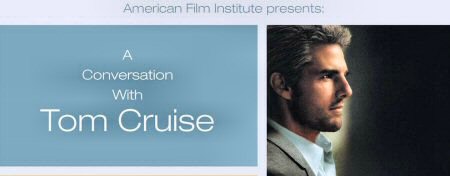
The more you think about Tom/Vincent, the more the ironies accumulate. Deftly played by a guy known for his own hard-wired intensity, this gray-suited assassin seeps through as a fairly sad figure despite Cruise barely revealing his emotional cards. Sad but oddly charitable, almost evangelical.
Cruise won’t win. The top contenders are Jamie Foxx’s Ray Charles performance in Ray and Paul Giamatti’s touchingly morose wine connoisseur and failed novelist in Sideways. But he deserves to be one of the five finalists, along with Javier Bardem in The Sea Inside and Liam Neeson in Kinsey.
This, in any event, is why Cruise showed up at UCLA’s Royce Hall on Monday evening. To goose his Oscar chances…without appearing to be precisely doing that.
It was billed as an American Film Institute event called “An Evening with Tom Cruise.” MTV personality and journalist Chris Connelly was the moderator. There were two soft leather chairs at center stage, and a huge screen just behind them for showing film clips. The tickets were $20 bucks a pop. The auditorium was just about filled, but not quite.
There was a lavishly catered press reception before the event. Dressed entirely in dark brown (his sister-publicist LeAnn Devett swore that his close-cropped hair hadn’t been dyed that color, but it looked that way to me) and wearing a two or three-day stubble, Cruise stood near the main entrance and talked to anyone who had the patience and the moxie to wait 15 to 20 minutes to push through and wait their turn.
I’m too aloof for that kind of grovelling. What would I say if I got to the guy? I guess we could talk about our mutual friendships with Cameron Crowe and Robert Towne. And I could ask why his Last Samurai character managed to survive that samurai-on-horseback charge straight into a hailstorm of machine-gun bullets. And I guess I could float my pet theory that Cruise’s character was actually a werewolf — i.e., killable only with silver bullets.
A journalist friend who’d interviewed Cruise at press junkets was complaining that “he doesn’t give you anything.” A lot of journos feel that Cruise’s patter is too much about precision, exactitude, presentation. He never relaxes, never lets his guard down.
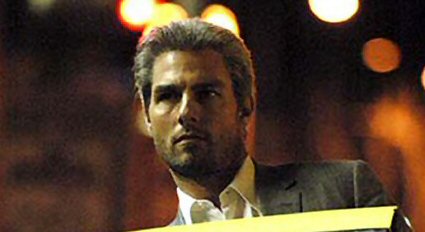
His fans see things differently. It’s one thing to look at the big grosses for Cruise’s films in the pages of Variety, and another to actually feel the ardor. The fans at Royce Hall were squealing, whooping…it felt almost Beatle-esque when Cruise walked on stage just after 8 pm. “We love you!,” cried a group of college-age girls to my left. “We love you too!” said another group to the right.
Cruise was obviously “on,” but he seemed fairly open to the give and take. He didn’t act or sound like an especially icy type. He seemed more in the realm of being intense, focused….not so much a controller as an uber-regulator. He showed an obvious liveliness of spirit and seemed eager to really listen to people, although perhaps a bit too eager to laugh at times. I forgave him for that.
The show lasted just under two and a half hours. Every 20 minutes or so, the house went dark and Cruise clips were shown. And yet no clips from All The Right Moves or The Outsiders or Curtis Hanson’s Losin’ It. And no acknowledgements than any of these films might have been letdowns for the audience, or for Cruise, which of course happens from time to time.
I couldn’t hear any groans when they ran clips from Days of Thunder (i.e., Top Car) and Far and Away, but then the sound levels were high.
Connelly was crisp, polished and TV pitchman-like. Always going for the jovial chummy tone. Cruise said at one point that he used to imitate Donald Duck as a youth, and Connelly urged him to do it for the crowd. Cruise gave it a shot and made a sound like a duck farting. Connelly to crowd: “What about that? Not bad!”
Cruise is a pretty good mimic though. He did an excellent Jack Nicholson a while later (i.e., acting the bar-rage scene from The Last Detail). I read somewhere he’s great at doing an Al Pacino/Tony Montana. He did a first-rate imitation of Jon Heder doing his Napoleon Dynamite voice.
The place went wild when they showed the famous clip of Cruise dancing in his underwear in Risky Business. The crowd was clapping in time to that Bob Seger beat. “I’ve never done anything like this in which they show clips,” Cruise said later on. “This is pretty amazing.”
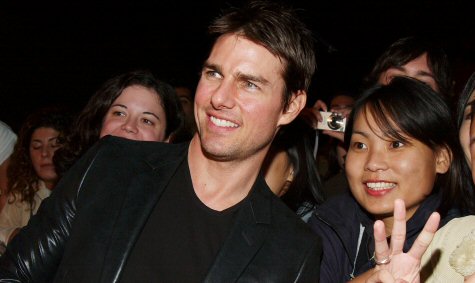
Cruise posing for photos with fans after Monday’s AFI Royce Hall event
Cruise recalled that when he first got to Los Angeles and hadn’t worked anywhere, he went to an open audition and read some lines. The casting director asked him, “New to California?” Cruise said yes. “Staying long?” Depends, Cruise answered. The casting director said, “Get a tan.”
He was also told during this stage, “Do movies. You’re too intense for television.”
Connelly asked him about always being recognized and dealing with the fame game. He quoted a line from Bob Dylan’s recently released book: “Privacy is something you can sell, but you can never buy it back.”
The clips reminded me that Cruise was on the physically chunky side in the early to mid `80s, and that he suddenly slimmed down when he appeared in Rain Man in ’88. Cruise said he became a Scientologist right around (or was it right after?) doing Martin Scorsese’s The Color of Money in ’86. I guess he went on some kind of Scientology diet.
“Before making The Color of Money, I had seen Raging Bull five times,” he said at one point. “If I like a movie I see it over and over. Now with DVD I sometimes just sit and re-watch scenes.”
He recalled that when he started shooting Taps and didn’t know how well he or the film would perform, he said to himself, “If this is it, then this is it…enjoy it for what it is.”
“I was always the kid who climbed to the top of the tree in a rainstorm,” he said later. “I’ve always wanted to risk it all.”
Cruise said more than once that “money doesn’t matter” to him as much as going for the challenge and the creative excitement. He said he only wants “a fair exchange in regard to what I’m worth.” Monetarily, he declared, “I’m doing okay.”
“I’ve never met a normal person,” he said toward the end of the chat. “Every person is unique. Every person has a story to tell. Films are personal, character is personal…”
When he was younger he always used to call people “sir.” His publicist Andrea Jaffe finally told him, “Look, you’re freaking people out. Stop saying ‘sir’ and ‘yes sir.'”
He told an amusing story about the months-long shooting of Stanley Kubrick’s Eyes Wide Shut, and how long it took his costar Sydney Pollack (who’d directed him in The Firm) to understand that sometimes Kubrick was more into blocking and thinking things through than actually filming. But EWS only cost $250,000 per week to shoot, or $1 million a month, he said. (That’s relatively cheap for a big-studio film.)
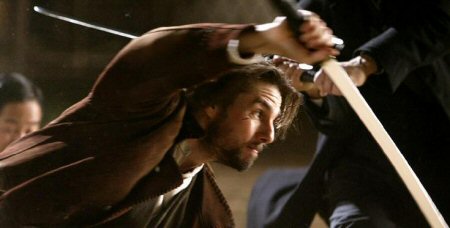
After many, many months of shooting, Cruise went up to Kubrick and said, “I gotta go, Stanley.” Kubrick said okay “and I left,” said Cruise. “And the movie was done.”
He said his goal is to climb Mount Everest. He said he was open to doing a musical. He said he was also willing in doing a straight play, although he seemed a little hesitant about this. His most emphatic statement of the night was, “I was born to make movies,”
Right now he’s doing final pre-production work on Steven Spielberg’s War of the Worlds, which starts shooting in early November and will be out next June. Then he’ll start work on Mission Impossible 3. During the q & a portion near the end I wanted to ask Cruise about the creative conflicts that resulted in Narc director Joe Carnahan’s leaving that project, but I wasn’t chosen.
An agent friend said to me later that evening, a couple of hours after the show was over, that the fans love him because Cruise projects regular-guy vibes — “He’s someone they feel they can relax with over a drink” — and because women think he’s cute and guys want to be like him.
“But he’s not that guy,” my friend argued. “He’s royalty and acts like royalty. He always gets the biggest perk packages when he shoots a film. He lives in a royal realm. He’s not an average type of guy at all.”
Okay, I said, but isn’t that what made him a star in the first place? Not being average?
And don’t people like worshipping royalty? Isn’t that built in to our genes? The urge to show obeisance before power?
“I’m just saying he’s not the guy he presents himself to be,” she said.
To the Wolves?
It’s no secret that I really like Charles Shyer’s Alfie. I don’t think it plays well; I know it does. It may not have the jolt or punch that the original Michael Caine version had in `66, but it’s a believably acted, exquisitely edited, richly scored character piece. It’s not quite Rules of the Game, but it’s a long way from a burn.
I especially liked that Alfie has the character and intelligence not to go all mushy at the end and deliver a conventionally happy turnaround ending. This despite the fact that one of Paramount’s Alfie trailers seems to suggest that Jude Law’s lead character, a hard-core hound who casually hurts women’s feelings through the film, hooks up with costar Marisa Tomei at the end and makes like a father to her young son, etc.
The problem is this: I was told earlier this week that Alfie is “not tracking.” This means it isn’t showing up in moviegoer surveys as something that a good-sized percentage of the audience wants to see. Apparently Law’s name isn’t enough of a draw on this score. He’s seen as more of an “industry star” than a public one.
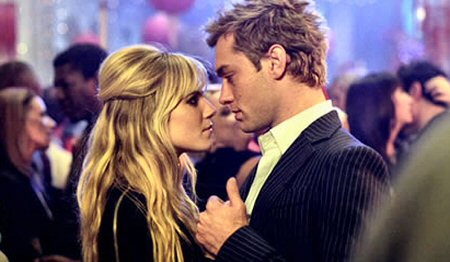
The standard way to raise awareness and create want-to-see with an upcoming film is to show nationwide “sneaks” the weekend before it opens so people will see it, like it and spread the word. The only reason you don’t do this is if distribution execs are concerned that the word of mouth may not be so hot, which could result in the opening weekend tally coming in lower.
Paramount is apparently not planning any Alfie sneaks this weekend, so draw your own conclusions. I understand why, and at the same time I don’t. This movie sells itself and doesn’t screw anyone over. Law gives his most movie-star-ish performance ever. He really leaves that character-actor attitude in the dust.
I think distribution should be like parenting. Your love should always be absolute and bountiful. Especially when it’s time for your child to meet the world and fend for himself. You shouldn’t raise, bathe, feed, nurture and teach your little boy only to push him out the front door on his very first day of school and say, “Okay, buddy…the bus is down the street….see ya later!” You have to stand by your child, hold his hand, show support and keep showing it.
It’s not just that deceptive trailer. The Alfie one-sheet is also a bit lame. By emphasizing only the fact that Jude Law is good looking and not indicating there are all kinds of layers to this film (which there are), they make it look like lightweight fluff.
Alfie isn’t that. It’s a far better film than what Paramount marketers are trying to suggest, and I just can’t imagine average filmgoers seeing this en masse and going “eh.”
Courage
“Dude, you have to calm down about the election. Kerry is going to win this thing and win it big. When you see these poll numbers that don’t look good for Kerry, take a look at the internals. They invariably oversample GOP voters (assuming more Republicans will turn out to vote than Democrats).

“That’s not the case. It wasn’t the case in 2000, when all the polls had Bush winning by 6-8% and he wound up *losing* the popular vote. And it certainly isn’t the case this year, when Democrats are more fired up than they’ve ever been and millions of first-time voters will pick Kerry. Hang in there.” — Clay Clifton
Last Lap
I ran into the mythical producer’s rep Jeff Dowd (a.k.a. “the Dude”) Tuesday night at the Grove. He told me he was on his way to Ohio today to do some kind of get-out-the-vote work for the Kerry campaign. Dowd’s positivism about what he’s certain will happen next Tuesday is almost a contact high.
Dowd also told me that George Butler’s Going Upriver: The Long War of John Kerry is now viewable for free online. The URL is www.thekerrymovie.com.
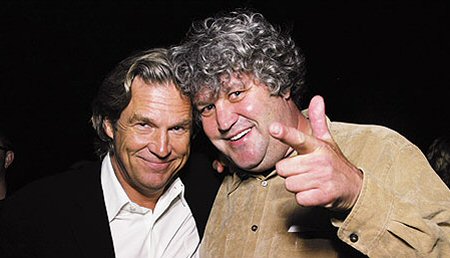
Big Lebowski star Jeff Bridges (l), original “Dude” and one-man Kerry vote-driver Jeff Dowd
Dowd had nothing do with the following, but here’s a well-reasoned endorsement from the pages of The New Yorker:
“[John] Kerry’s performance on the stump has been uneven, and his public groping for a firm explanation of his position on Iraq was discouraging to behold. He can be cautious to a fault, overeager to acknowledge every angle of an issue; and his reluctance to expose the Administration’s appalling record bluntly and relentlessly until very late in the race was a missed opportunity.
“But when his foes sought to destroy him rather than to debate him they found no scandals and no evidence of bad faith in his past. In the face of infuriating and scurrilous calumnies, he kept the sort of cool that the thin-skinned and painfully insecure incumbent cannot even feign during the unprogrammed give-and-take of an electoral debate.
“Kerry’s mettle has been tested under fire — the fire of real bullets and the political fire that will surely not abate but, rather, intensify if he is elected — and he has shown himself to be tough, resilient, and possessed of a properly Presidential dose of dignified authority. While Bush has pandered relentlessly to the narrowest urges of his base, Kerry has sought to appeal broadly to the American center.
“In a time of primitive partisanship, Kerry has exhibited a fundamentally undogmatic temperament. In campaigning for America’s mainstream restoration, Kerry has insisted that this election ought to be decided on the urgent issues of our moment, the issues that will define American life for the coming half century.
“That insistence is a measure of his character. He is plainly the better choice. As observers, reporters, and commentators we will hold him to the highest standards of honesty and performance. For now, as citizens, we hope for his victory” — New Yorker editors.
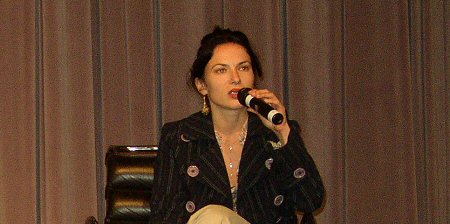
Xan Cassevettes, director of Z Channel: A Magnificent Obsession, after last Monday’s Movie City News screening at the Pacific Design Center. MCN is holding a series of weekly screenings of possible/likely Oscar-worthy films and they’re open to all awards voters including AMPAS, SAG, WGA and BFCA members. I have a problem with the seating (there’s not enough leg room) at the PDC auditiorium, but it’s otherwise a very agreeable amtosphere for seeing films.
